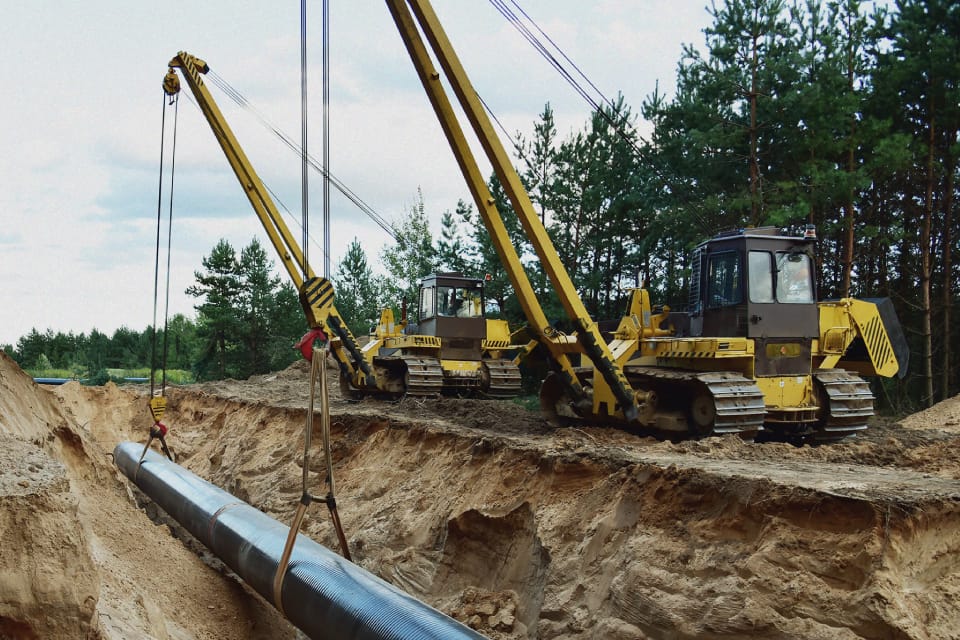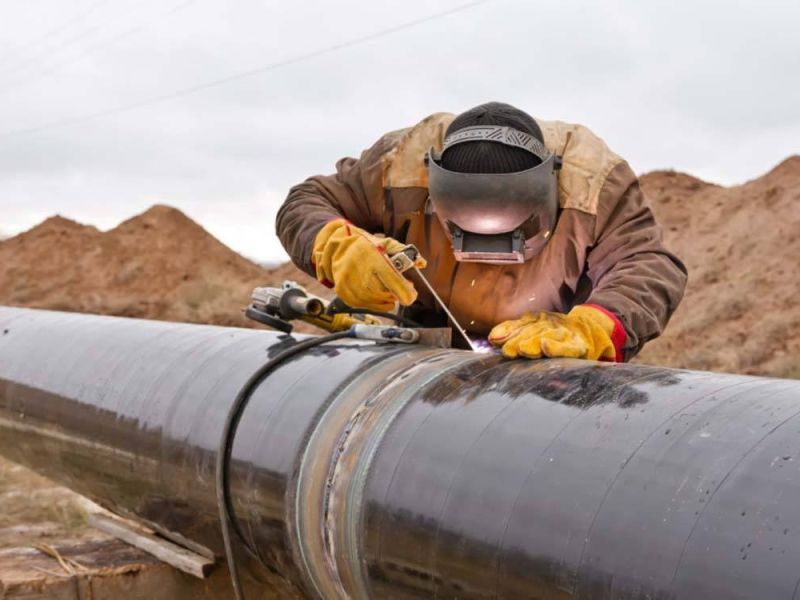A Comprehensive Guide to Understanding Pipes and Their Duty in Building
Pipelines are vital components in construction, serving crucial functions in gas, water, and waste monitoring. Their option and application can significantly affect a building's performance and safety and security. Numerous products, such as PVC, copper, and PEX, use distinct advantages fit to specific needs (Creek Pipe Company). Comprehending these factors is vital for any kind of construction job. As one checks out the intricacies of pipes, the effects for conformity and public health become progressively evident
The Importance of Water Lines in Construction
Pipelines act as essential avenues in building, facilitating the motion of water, gas, and waste throughout buildings and infrastructure. Their duty extends past plain transportation; they are important for guaranteeing the capability and safety of commercial and domestic atmospheres. Appropriately installed pipelines add to the reliable distribution of sources, allowing daily activities such as cooking, heating, and bathing. Furthermore, pipelines play a pivotal role in waste monitoring, guaranteeing that sewer and wastewater are effectively eliminated from living spaces.The relevance of pipelines is additionally shown in their influence on public health and wellness. Defective or inadequate piping systems can cause contamination and hazardous conditions, making top quality products and setup methods vital. Furthermore, pipelines should follow various building codes and guidelines, which are created to secure both passengers and the atmosphere. Consequently, the value of pipelines in construction includes both useful capability and vital wellness considerations.
Sorts Of Water Lines Made Use Of in Structure Tasks
Various kinds of pipelines play a considerable duty in structure tasks, each made to satisfy specific requirements and applications. Amongst the most generally utilized pipeline types are PVC, which is resistant and lightweight to rust, making it optimal for water drainage and air vent systems. CPVC pipes, similar to PVC, can withstand greater temperature levels, frequently made use of in hot water systems. Copper pipelines are understood for their resilience and integrity, regularly utilized in pipes and home heating applications. Galvanized steel pipes, while less usual today, were when a standard for water system lines due to their strength. In Addition, PEX (cross-linked polyethylene) pipelines are gaining popularity for property plumbing because of their adaptability and resistance to scaling and chlorine. Cast iron pipes are favored for their sound-dampening residential or commercial properties, commonly utilized in waste and soil systems. Each pipeline kind offers distinct functions, ensuring effective operation in construction tasks.
Common Materials for Pipeline and Their Properties
In building, the choice of pipe products is important for guaranteeing resilience and performance. Metal pipes use stamina and resistance to high pressures, while plastic pipelines supply corrosion-resistant and light-weight options. Composite pipes incorporate the advantages of both products, making them versatile alternatives for numerous applications.
Steel Pipeline Options
Metal pipelines are important parts in building and construction, providing a variety of options that provide to ecological problems and different applications. One of the most typical products include steel, copper, and cast iron. Steel pipelines are known for their toughness and resilience, making them suitable for high-pressure applications. Copper pipes are preferred for their corrosion resistance and antimicrobial buildings, typically utilized in plumbing systems. Cast iron pipelines provide outstanding noise insulation and are suitable for waste and water drainage systems. Each steel type has distinctive benefits; as an example, galvanized steel can stand up to rust, while stainless steel uses premium rust resistance. Choosing the appropriate metal pipeline depends upon factors such as cost, environmental direct exposure, and the certain needs of the building project.

Plastic Pipeline Advantages
Plastic pipes have actually gotten popularity in building due to their lightweight nature and flexibility. These pipes, made from products such as PVC, CPVC, and PE, offer excellent resistance to deterioration and chemical damage, making them ideal for various applications. Their simplicity of setup more enhances their allure, as they can be cut and signed up with without unique tools. Additionally, plastic pipelines are typically a lot more economical compared to steel options, adding to reduced general job expenses. Their smooth indoor surfaces minimize rubbing and improve flow rates, while insulation buildings help preserve temperature level control in plumbing systems - Creek Pipe Company. With a vast array of sizes and arrangements offered, plastic pipes effectively meet the varied demands of modern building jobs
Compound Pipe Characteristics
Composite pipes integrate different products to take advantage of their private toughness, leading to boosted performance and durability. Usually, these pipelines include layers that may consist of plastics, ceramics, and steels, each contributing one-of-a-kind residential or commercial properties. The internal layer might be made of a corrosion-resistant product, while the outer layer offers strength and impact resistance. This mix enables composite pipes to hold up against severe temperature levels and pressures, making them ideal more tips here for a vast array of applications, including supply of water and industrial processes. Additionally, composite pipes are commonly lighter than conventional products, facilitating simpler handling and installment. Their adaptability and flexibility to different settings make them a preferred selection read review in modern-day building tasks, making sure durability and performance in liquid transportation systems.
Applications of Pipeline in Pipes Solutions

Electric Channels: The Function of Piping in Electrical wiring
In modern-day building and construction, electric channels play an important function in guaranteeing the secure and effective transmitting of electric circuitry throughout structures. These pipes give a protective pathway for electrical cords, safeguarding them from physical damages and ecological aspects. Different materials, such as PVC, metal, and adaptable conduits, are used depending upon the certain demands of the installation.Furthermore, channels help in organizing wiring systems, minimizing the risk of electrical threats like brief circuits or fires. They likewise facilitate easier upkeep and upgrades, as cables can be accessed and replaced without significant interruption to the structure.Proper installation of electrical avenues is crucial for conformity with building ordinance and security laws. This structured strategy not just improves the durability of the electrical system however additionally adds to the general security and functionality of the structure, making electrical channels important in contemporary construction techniques.
Selecting the Right Pipeline for Your Job
Exactly how can one assure the appropriate pipeline selection for a construction this hyperlink task? The option process begins with comprehending the specific requirements of the job, including the kind of liquids being transferred, pressure ratings, and environmental conditions. Product choices, such as PVC, copper, and steel, ought to be examined based on durability, rust resistance, and thermal properties.Next, one must consider the pipe's size and flow ability to determine effective procedure. Regulative standards and codes must also be stuck to, as they determine the acceptable materials and practices for certain applications. Consulting with professionals and making use of comprehensive resources can even more help in making educated decisions.Finally, assessing the cost-effectiveness of different options is vital, stabilizing initial expenditures with long-lasting upkeep and substitute expenses - Creek Pipe Company LLC. By thoroughly evaluating these factors, one can with confidence choose the most suitable pipeline for their building and construction job, guaranteeing both functionality and conformity

Maintenance and Assessment of Piping in Construction
Correct selection of pipes sets the structure for their long-term efficiency, making maintenance and examination important components in building. Regular upkeep assurances that any kind of potential concerns, such as leakages, deterioration, or clogs, are determined and attended to without delay, reducing costly repair work and project delays. Scheduled assessments, consisting of visual evaluations and stress examinations, play a vital function in reviewing the stability of pipe systems.Additionally, monitoring environmental aspects, such as temperature level changes and dirt problems, can aid anticipate wear and tear. Utilizing innovative technologies, such as CCTV for indoor assessments, can enhance the effectiveness of upkeep initiatives. It is vital to document evaluation findings and maintenance tasks to develop a comprehensive background of the pipeline systems. By prioritizing upkeep and examination, building professionals can extend the life-span of their piping systems, guaranteeing they operate effectively and reliably throughout the project's period.
Regularly Asked Questions
Exactly How Do Pipelines Affect Power Performance in Structures?
Pipelines substantially affect power efficiency in structures by controling heating and cooling systems. Proper insulation and materials minimize energy loss, while effective plumbing styles minimize water use, inevitably bring about lower energy intake and functional prices.
What Rules Govern Pipeline Setup in Construction?
Laws controling pipe installation in construction generally consist of neighborhood and nationwide building regulations, plumbing codes, and safety standards. These warranty compliance with structural stability, material specifications, and health and wellness needs, advertising safety and performance in building methods.
Can Piping Be Recycled After Usage?
The question of pipe recyclability is substantial. Numerous products, such as metal and particular plastics, can be recycled efficiently. The problem and type of pipe impact reusing feasibility, demanding proper analysis before disposal.
Exactly How Do Weather Impact Pipe Performance?
Weather greatly affect pipeline performance. Extreme temperatures can cause growth or contraction, while moisture might bring about deterioration. In addition, hefty precipitation can increase dirt pressure, influencing security and overall performance of the piping system.
What Are the Signs of Pipeline Failure to Expect?
Indications of pipeline failing include leakages, unusual sounds, discoloration of water, reduced water stress, and noticeable deterioration. Routine assessments can help spot these problems early, stopping expensive repair work and guaranteeing system performance in the lengthy term. Pipes play a crucial role in waste monitoring, making certain that sewer and wastewater are properly removed from living spaces.The significance of pipelines is also shown in their influence on public wellness. In building and construction, the selection of pipe materials is vital for ensuring longevity and performance. Steel pipelines offer strength and resistance to high stress, while plastic pipes supply corrosion-resistant and lightweight alternatives. Additionally, pipelines are utilized to eliminate wastewater, attaching bathrooms, sinks, and drains to municipal sewage systems or septic tanks.Different types of pipes, such as PVC, copper, and PEX, are chosen based on factors like toughness, price, and particular application requirements. How can one ensure the right pipe choice for a construction project?